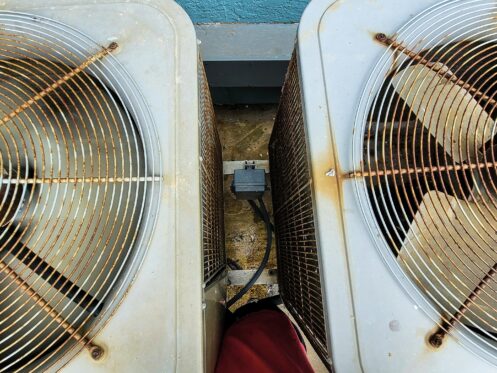The History of Heating, Ventilation, and Air Conditioning in Brief
We often overlook the significance of air conditioning until it malfunctions, but have you ever delved into its fascinating history? Who pioneered this essential comfort technology?
Early Days of AC
Back in the 1840s, before electricity’s widespread adoption, a Florida doctor and inventor named John Gorrie envisioned cooling as a means to combat illness and enhance comfort. His initial approach involved hauling massive blocks of ice from northern frozen lakes to cool hospital rooms, but the logistics were impractical. Gorrie then turned to refrigeration, developing a machine powered by horsepower, wind-driven sails, or steam to produce ice. While his invention received a patent in 1851, financial setbacks prevented its commercialization. Nonetheless, Gorrie’s innovations laid the groundwork for modern air conditioning.
The Birth of Air Conditioning
The credit for inventing air conditioning goes to Willis Carrier, an engineer at Buffalo Forge Company. Tasked with resolving humidity issues in a Brooklyn publishing firm, Carrier devised an “Apparatus for Treating Air,” patented in 1902. This system utilized cooling coils to either humidify or dehumidify air, effectively regulating temperature and moisture. Recognizing broader applications beyond textile mills, Carrier founded Carrier Engineering Corporation in 1902, marking a significant milestone in AC history.
Key Milestones in Cooling Technology
In 1906, Stuart Cramer, a textile mill engineer, coined the term “air conditioning.” The first residential AC unit was installed in 1914, albeit bulky and costly. The evolution continued, with the introduction of mechanical refrigeration at the 1904 St. Louis World’s Fair, offering glimpses of cooling for comfort. Theaters soon adopted modified heating/cooling systems, though initially, they faced challenges in maintaining uniform temperatures.
Heating Innovations
While cooling was taking strides, heating technology also progressed. Benjamin Franklin’s cast iron stove in 1742 marked an early innovation, paving the way for subsequent heating advancements. By 1885, riveted-steel coal furnaces and cast-iron radiators became commonplace, enabling efficient heat distribution in homes. The advent of forced-air furnaces in 1935 further revolutionized heating.
Expanding Horizons
Carrier’s contributions extended beyond cooling; his company installed advanced cooling systems in theaters and introduced centrifugal chilling at New York’s Rivoli Theater in 1925. Frigidaire and General Electric also entered the HVAC arena, introducing compact room coolers and pioneering self-contained units.
The Modern Era
Since 1947, air conditioning units have become more compact and affordable. By the 1960s, central air conditioning became a standard feature in newly constructed homes. Today, AC units are ubiquitous, playing a crucial role in maintaining comfort and saving lives, particularly during heatwaves.
The Importance of HVAC
Air conditioning not only enhances comfort but also saves lives by mitigating heat-related illnesses. Between 1960 and 2004, heat-related deaths in the United States decreased significantly, highlighting the vital role of AC systems.
REGISTER NOW FOR THE 2024 JOHN HENRY’S ANCIENT AC CONTEST TO WIN A COMPLIMENTARY AIR CONDITIONER! Just HOW OLD is your AC? By completing this form, you will also be entitled to a $20 coupon redeemable on an HVAC SERVICE. Call (402) 200-5808 to claim and mention your registration.
- The contest is for owner-occupied, single-family homes with existing central air.
- The existing furnace must be operating and providing heat to the home, and be the primary heat source in the home.
- All prizes in the Oldest Working AC Contest are non-transferable and may not be redeemed for cash.
- No entry fee or purchase is required to enter.
- Winner of the Oldest Working AC Contest must reply within five (5) days of notification either via email or by calling the phone number provided upon prize notification, or else an alternate winner will be selected.
- The winner must agree to be posted online on the John Henry’s website and our social media sites.
- In the event of a tie, the earliest contest entrant shall be the winner.
- The duct system must be in good condition and properly sized for the furnace/AC. The duct system, evaporator, and drain pan must be free of mold.
- For entry to be valid, representatives from John Henry’s Plumbing, Heating, Air, and Electrical must be allowed access to the furnace and duct system to examine the installation and record manufacturer nameplate information (model & serial numbers and dates).
- All other mechanical operations of the home must be up to code which inldues but is not limited to gas and electrical.
- Winner to be announced August 1, 2024.
- NO PURCHASE NECESSARY TO ENTER OR WIN. A PURCHASE WILL NOT INCREASE YOUR CHANCES OF WINNING.
The Best in HVAC, Plumbing, and Electrical Services in Lincoln and Omaha, Nebraska
At John Henry's Plumbing, Heating, Air, and Electrical, we have been the leading name in electrical, plumbing, and HVAC services in our area since 1996. We are committed to providing homeowners with quality services and the best value for their money. We are a family-owned business that offers upfront pricing. We are proud winners of the Better Business Bureau integrity award and other awards and certificates highlighting our commitment to our customers.

